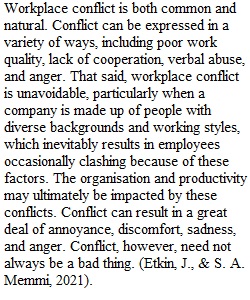


Q Competency Evaluate the importance of affecting and managing relationships. Student Success Criteria View the grading rubric for this deliverable by selecting the “This item is graded with a rubric” link, which is located in the Details & Information pane. Scenario Recall a time when you were involved with a conflict in the workplace, or witnessed a conflict at work. This situation should be one that involved a relationship of some kind (i.e. manager-employee, employee-employee, etc.) where a conflict occurred. Think about how this experience could have been improved if you had had a mentor or a coach to help you through the situation. Instructions Reflect on an experience of a conflict and how it could have been improved with a mentor or coach. From this experience, create a mentoring or coaching document. In your document, think about conflict management and relationship management strategies. Include the following in your mentoring/coaching document: 1. What was the conflict and relationship? 2. Did you see things the way they really were, or were your eyes opened to something else? Was there any bias? Explain. 3. How would you have done things differently? Why? 4. How did that experience affect other relationships?
View Related Questions